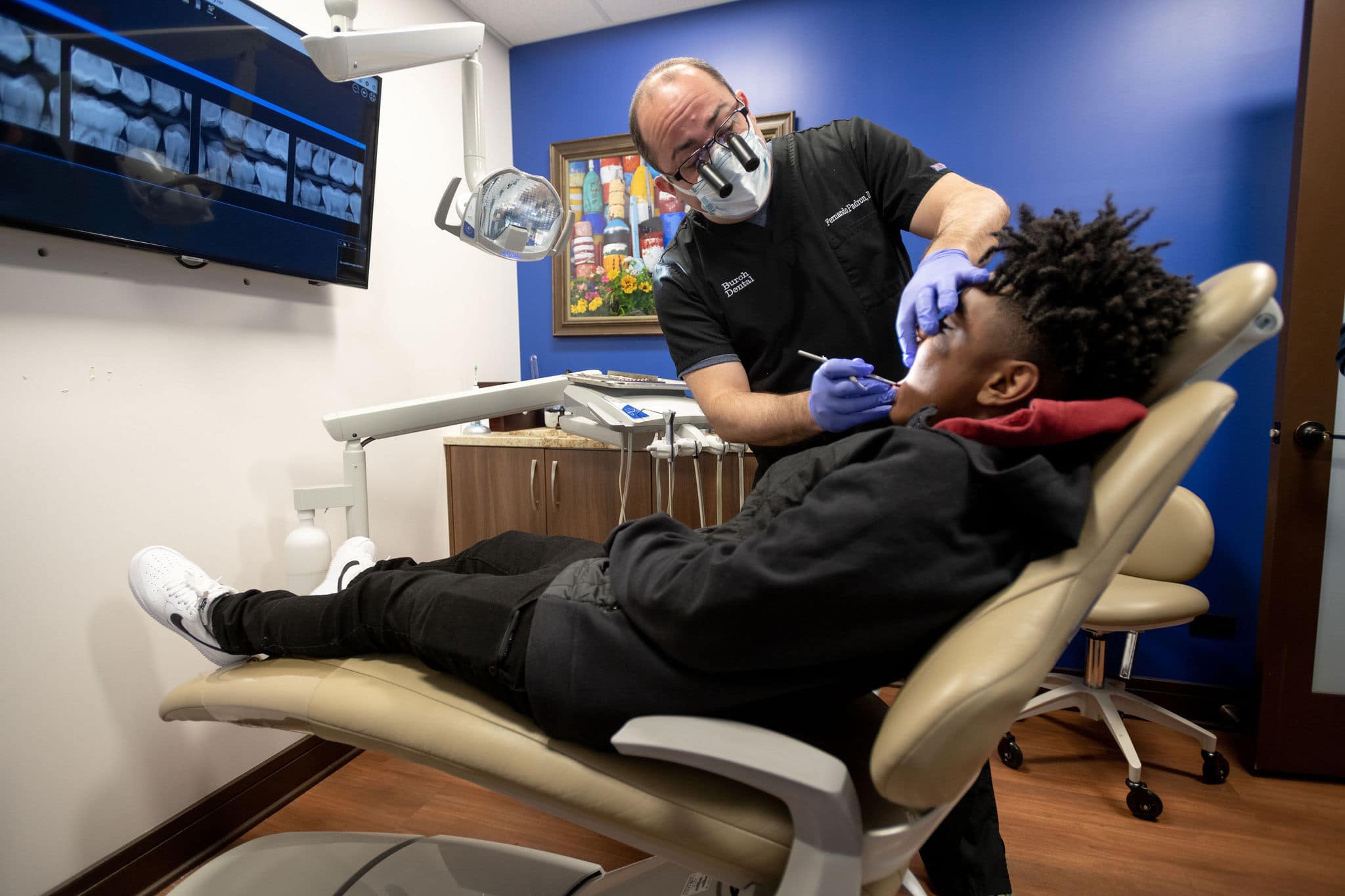Gum Disease and Recession
Rockford & Loves Park, IL
Gum Disease and Recession
Rockford & Loves Park, IL
Beginning with damaging oral bacteria, gum disease is considered a huge factor contributing to loose or missing teeth among patients that are aged 35 and up and it can also be connected to many worrisome physical health conditions.
Gum disease or periodontal disease is identified by three progressive phases. The first stage of periodontal disease is called gingivitis, followed by the second, periodontitis. The final and most serious level of the condition is advanced periodontitis. Diagnosing and treating gum disease and recession promptly will stymie and reverse the progression.
Beginning with damaging oral bacteria, gum disease is considered a huge factor contributing to loose or missing teeth among patients that are aged 35 and up and it can also be connected to many worrisome physical health conditions. These bacteria hide within the plaque and tartar deposits that build up on the enamel of each tooth. They generate toxins that will immediately harm the teeth, gums, bone, and the ligaments that keep each tooth in the correct place.
The team at Burch Dental has a simple goal. That is to ensure your trust through our commitment to quality treatment and your continued satisfaction. It is our daily agenda to maintain a caring environment that is respectful and comfortable for everyone. Our team members are united in our efforts to promote oral health by means of prevention, enhancement, wellness, and rejuvenation. Call or visit one of our convenient locations today to schedule your appointment for an evaluation to determine if you would benefit from periodontal therapy to address gum disease and recession.
What are the symptoms of gum disease and recession?
The symptoms of gum disease are not obvious until it has already progressed to the next level. Consider seeing us at Burch Dental if you suspect that you might have any of the following symptoms:
- Your gums are swollen, red, or tender.
- There is bleeding when brushing or flossing your teeth.
- Your gums have receded or have pulled away from your teeth.
- You have discomfort or pain in your mouth.
- You can see pus between your gums and teeth.
- You have sores in your mouth.
- Your family and friends complain about your terrible bad breath.
- You notice loose or separating teeth.
- Your teeth no longer fit together when you bite.
Call Burch Dental for an evaluation if you observe one or more of these probable symptoms of periodontal disease.
Periodontal Therapy Options for Gum Disease and Recession
There are several surgical and non-surgical periodontal therapy options available that can effectively reverse the impact of gum disease and gum recession that will reduce the possibility of tooth loss, prevent the need for tooth extractions, or reduce the need for any dental bone grafts.
Common periodontal therapy procedures include the following:
- Scaling and Root Planing: A process of a deep cleaning of your teeth that removes plaque and tartar that have developed below the gum line. Scaling refers to the removal of plaque and calculus from the surface of your teeth, and root planing refers to the smoothing out your teeth’s roots to remove persistent bacteria and speed up the healing process with the gum tissue.
- Periodontal Laser Treatment: This procedure removes your gum tissue that has become diseased. You might wish to pursue this option with Burch Dental because unlike traditional treatments, periodontal laser treatment causes less discomfort and less gum shrinkage.
- Periodontal Plastic Surgery: A reshaping procedure that is performed to improve the aesthetic appearance of your gum tissue.
- Dental Implants: The dental implant process begins with the extraction of a decayed or damaged tooth, followed by an x-ray to determine if there is adequate jawbone to properly hold a dental implant. If you are a viable candidate, a titanium post will be surgically inserted into your jawbone. After this has healed, the artificial tooth or bridge will be placed on this post, which acts like a new root.
How Do We Treat Gum Disease and Recession?
Discovering your gum disease as soon as possible may be critical to improving the condition of your oral structures. To determine whether your gum disease is affecting your dental wellness, we will use a precise tool to measure the gaps, or recession, between your gum tissue and your tooth roots. If these pockets are more than 3 millimeters in depth, it may be a matter of concern. X-rays will help us in assessing the level of bone tissue around each tooth to determine the stage of gum disease.
At Burch Dental we provide advanced screenings to identify the stage of your gum disease and will develop the correct procedure for treatment. The beginning stage of gum disease is usually addressed through a thorough cleaning and an improved at-home dental hygiene program. To treat the second stage of gum disease, treatments are repeated every few months in conjunction with antibiotics. The advanced stage of gum disease may be best managed through a surgical approach.
Do You Have Gum Disease and Would You Benefit from Periodontal Therapy?
You may require treatment for gum disease if you have some minor gum tissue inflammation and bleeding. If you have any loose teeth and significant deterioration of any oral tissues you would require treatment. When Burch Dental discovers gum disease and addresses it early, you will have an increased opportunity to mitigate the condition's harmful symptoms altogether. You might have bleeding gums or puffiness and consider it ordinary. Bleeding and various other symptoms of gum disease are never typical and should be looked at immediately by our team.






